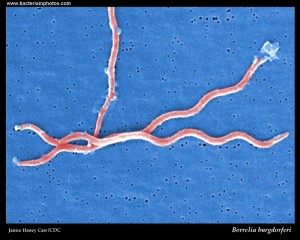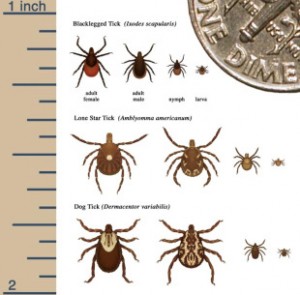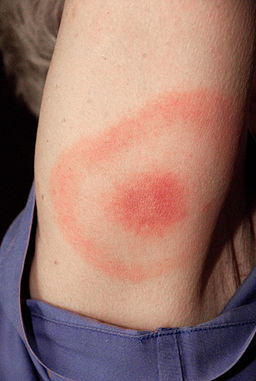Five days have passed and my black fly bites have finally stopped itching. I need to get outside and plant some flowers, but I’m procrastinating because the flies are out there waiting for me, and so are the deer ticks. Teeny creatures that barely tickle when they crawl across your skin, but which can cause a heap of trouble because they can carry the bacterium that causes Lyme Disease.
Not all ticks are deer ticks and not all deer ticks transmit Lyme Disease. But you never know, so you have to be careful. Follow the same emergency preparedness tips I gave you for avoiding black flies (except you don’t have to wear a head net). Check yourself over carefully and make sure to look in body folds, behind your ears, and in your hair.
From now until July, deer ticks are in the nymph stage and are only between 1/32″ and 1/16″ — wicked tiny. You can order a handy poster with actual-size pictures of deer and other ticks by contacting Mainely Ticks.
If you find any ticks on you, try not to freak out, but do remove them promptly. According to the Maine Medical Center Research Institute and the Maine CDC, ticks usually need to attach for 36 hours to transmit Lyme Disease.
How to remove a tick
- Grasp the tick close to the skin with fine-tipped tweezers
- Pull gently upward with steady, even pressure until the tick lets go
- After removing the tick, thoroughly clean the bite area and your hands with rubbing alcohol or soap and water
- Don’t use Vaseline, alcohol or nail polisher remover because they don’t work
- Write down the date you found the tick just in case
- Consult a physician if you removed an engorged tick or if you develop a rash or fever within several weeks of removing the tick
Stage 1 symptoms of Lyme disease (usually occur within a month)
- Chills
- Fever
- Headache
- Lack of energy
- Achy joints or muscles
- Rash that resembles a bulls-eye (an estimated 85% will get a rash)
Stage 2 symptoms of Lyme disease (one to four months)
- Tiredness
- Additional rashes
- Pain, weakness or numbness in the arms or legs
- Paralysis of nerves in the face
- Recurring headaches or fainting
- Poor memory, inability to concentrate
- Conjunctivitis
- Occasional rapid heartbeats
Stage 3 symptoms of Lyme Disease (several months or years)
- Joint swelling, especially the knees
- Numbness and tingling in hands, feet or back
- Severe fatigue
- Neurologic changes
- Chronic Lyme arthritis
Lyme disease is easily treated in the early stages with antibiotics. Antibiotics are also used to treat later stages of the disease. There used to be a vaccine available, but it was taken off the market in 2002, supposedly because there wasn’t enough demand.
In Maine, health officials keep track of cases of Lyme Disease and issue a yearly report.
Maine Lyme Disease Summary, 2010
- 734 confirmed and probable cases
- Symptoms of reported cases*
- Characteristic expanding rash
- Arthritis (joint swelling)
- Neurological (Bells Palsy or another cranial neuritis)
*Cases could report more than one symptom
- Hospitalization occurred in 23 cases
- Among patients with a reported date of symptom onset, 56% began experiencing symptoms during June, July, or August. Date of symptom onset was missing for 30% of cases.
- The highest number of cases (64%) was among middle-aged adults
I don’t want you to think I’m an alarmist — hey, I spared you the shock effect of an enlarged photo of a deer tick. I also don’t want you to think I’m a wuss who denies herself the pleasure of the beautiful Maine outdoors. My only goal is to give you some useful information and links to more if I didn’t give you enough. You are welcome!




My understanding about the Lyme Vaccine was that it was actually giving people who took it full blown Lyme Disease. Thus the ” lack of demand” excuse. I also understand there is an alternative vaccine under study now which seems to have more promise. I’ll be first in line to get the vaccine when it becomes safe and effective.
Tim,
This past February the journal Clinical Infectious Diseases published five articles about what happened and the need for a new Lyme disease vaccine. In one, Dr. Gregory Poland, Professor of Medicine at the Mayo Clinic and a vaccine expert, said it appeared that a combination of things led to the vaccine being taken off the market, including that it might cause arthritis, one of the late-stage symptoms of Lyme disease. He also said that other vaccines are “… unlikely to be developed, tested, and used within the United States in the near future, thus leaving at-risk populations unprotected.”
In another article Dr. Stanley Plotkin, who developed the rubella vaccine, wrote, “A vaccine against Lyme disease was licensed in the United States in 1998 but was subsequently removed from the market because of lack of sales. I believe that the poor acceptance of the vaccine was based on tepid recommendations by the Centers for Disease Control and Prevention (CDC), undocumented and probably nonexistent safety issues, and insufficient education of physicians. A new vaccine is feasible but will not be developed unless there is a demand by infectious diseases specialists, epidemiologists, authorities in affected states and the public that is evident to manufacturers. The fact that there is no vaccine for an infection causing ∼20,000 annual cases is an egregious failure of public health.”
Apparently, there is ongoing research — for instance, one study is looking at deactivating a key gene in the bacteria that causes Lyme Disease. In another, scientists are investigating an enzyme that controls saliva production in ticks and how turning off the enzyme might prevent the ticks from feeding and ultimately transmitting disease.
Some of this research may be promising but unfortunately, right now there is no Lyme disease vaccine available for humans.
I really appreciated your comments because they made me dig deeper for more information. Thank you and be safe!
Have anyone looked into vaccine available in Europe for Lyme? Do their vaccine have similar side effect as the one that was pull out of the market in US?
From what I’ve read, in Europe it would be necessary to develop a vaccine that would protect against three to four species of ticks that can cause Lyme Disease. They have a vaccine for dogs, but I’m not aware of one for humans.
I was diagnosed with Lyme disease in March after my Vet. had found that my dog has it, and suggested i be tested. We were treated with the same medication Doxycycline 100mg. for 42 days. I felt better at first, but it seems as if all the pain has returned, now my Doctor has me on Celebrex 200mg. Please let me know if there is a doctor that knows how to treat this disease, or what i should be doing, my doctor admits He does not know much about Lyme but also did not recommend any Doctor that does.
Gracen,
There are certainly many doctors who are familiar with Lyme Disease, especially in the New England area — you might start with an infectious disease specialist. Where do you live?
Go to http://www.mdjunction.com, find the Lyme board. Post a message stating where you live and that you need a Lyme literate medical doctor (llmd) and the name of one will be emailed to you. Lyme docs are kept under wraps because there is so much controversy over the treatment of the disease with long term antibiotics. If you still have symptoms, you did not receive sufficient antibiotic treatment.
There is a Lyme petition at the following address:
https://petitions.whitehouse.gov/petition/reform-infectious-disease-society-america-treatment-guidelines-lyme-disease/Pj9jG0pX
The petition will only be up until 2/10/13, and we need 25,000 signatures for the White House to review and respond.
This is the best chance for raising Lyme awareness I have seen, so please spread the word!